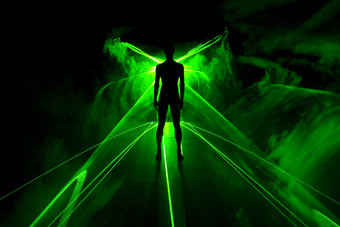 |
Lee Serle, Mortal Engine photo Andrew Curtis |
Throughout the 40 minutes preceding this moment, we have watched much more astonishing feats of technological interaction created in the fruitful collaboration between Gideon Obarzanek and his dancers with Fox and German new media artist, Frieder Weiss. Just when you think you’ve seen all it can do, it surprises once more. But the engagement of the audience in those first 40 minutes appears more passively appreciative.
In Mortal Engine, the Chunky Move dancers move at full stretch. In fact, I’d be surprised if at the end of all the touring they have in the pipeline, they haven’t grown a few inches. These extensions of leg and arm are required to gain maximum effect from the interactive projections that follow the dancers wherever they move. And because the stage is at a steep rake, to show the feats of light at their best the dancers are often splayed on the floor face down, crawling, rolling, merging into piles of bodies or shadowy shapes that might be animal or vegetable. There’s a whole sequence in which the electronics take centrestage and dance to their own music.
The floor pieces are interspersed with standing sequences in which dancers in twos and occasional threes perform against sections of the floor that rise to vertical. Now the bodies are identifiably human, and for the first time, we see their faces. But even now they appear as if unconscious, asleep with eyes open. Here the interaction between the dancers and the symbiotic technology perhaps becomes more evident to informed sections of the audience though there’s a sense that for many, what’s happening is a mystery. A couple emerges, their movement enhanced by a dazzling array of video fields some accompanied by sound, all of this manipulated by the dancers themselves. But equally, this might be interpreted as a couple pinned down in some technological nightmare not of their making. At another point the couple shift position against a white background, their grey shadows lumbering behind them to what sounds like the rumble of the Earth moving at its core. Though Gideon Obarzanek has deliberately opted for a world in which the line is blurry, it occurred to me, especially on this second viewing of Mortal Engine, that to engage with this work fully, the audience could do with a dramaturgical hook that makes it clearer just who’s zooming who.
So while images dazzle, the strength and prowess of the dancers impresses mightily, we watch in silent awe and wait until the slightly cheesy laser sequence for our moment of zen, our real engagement with the interaction that’s occurring in this work. The first 40 minutes reveals a flat, ominous world in which human and ‘other’ beings are mysteriously moving and being moved or colonized. In the vertical world, the inhabitants are asleep, every move exaggerated by the light and sound that surround them. Nothing in the scenario hints at the reality of the performer-technology relationship. Only at the end, do we get the matching gesture we’ve been craving, the sense of human agency intervening in the technological landscape, taking control of it however fleetingly and with this moment comes the ‘wow.’
Chunky Move, Mortal Engine, direction, choreography Gideon Obarzanek, performers Kristy Ayre, Sara Black, Amber Haines, Antony Hamilton, Marnie Palomares, Lee Serle, James Shannon, Adam Synnott, Charmene Yap, interactive system design Frieder Weiss, laser & sound art Robin Fox, composer Ben Frost, set design Richard Dinnen, Gideon Obarzanek, lighting design Damien Cooper, costume designer Paula Levis; Malthouse Theatre, Melbourne, Mar 4-8; Dance Massive, Mar 3-15
© Virginia Baxter; for permission to reproduce apply to [email protected]








 back
back